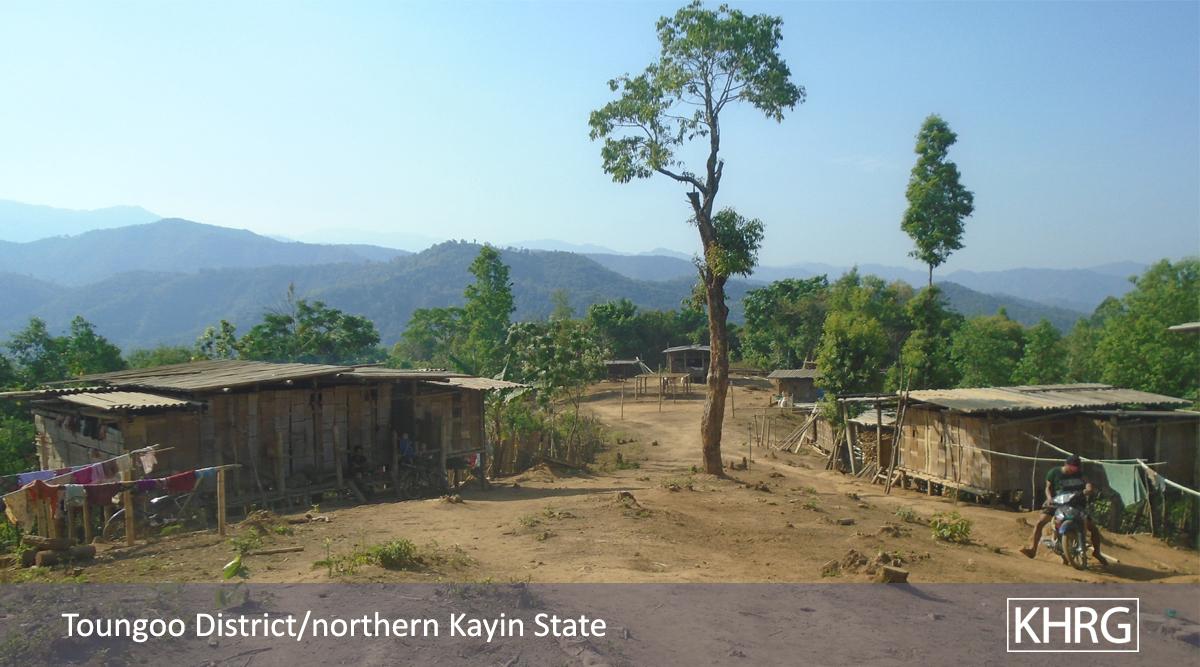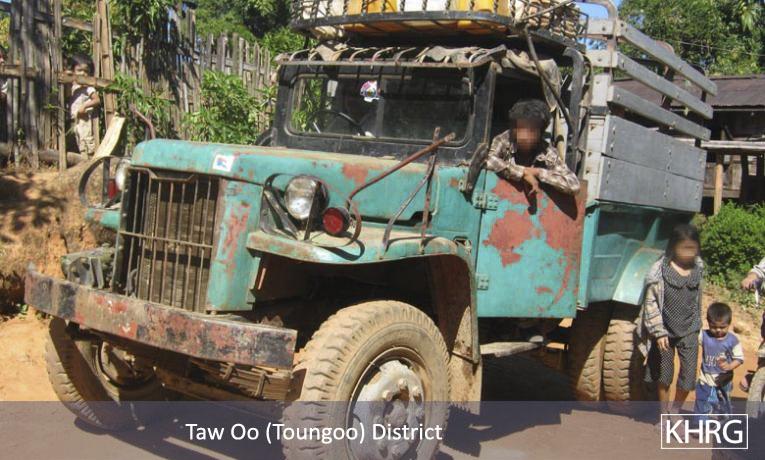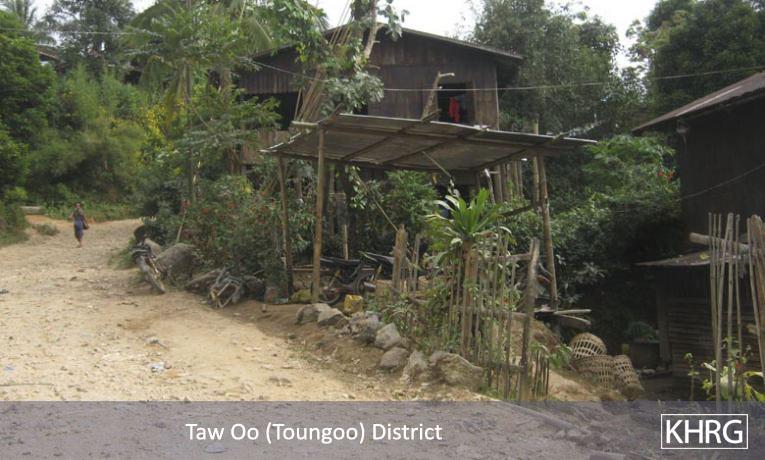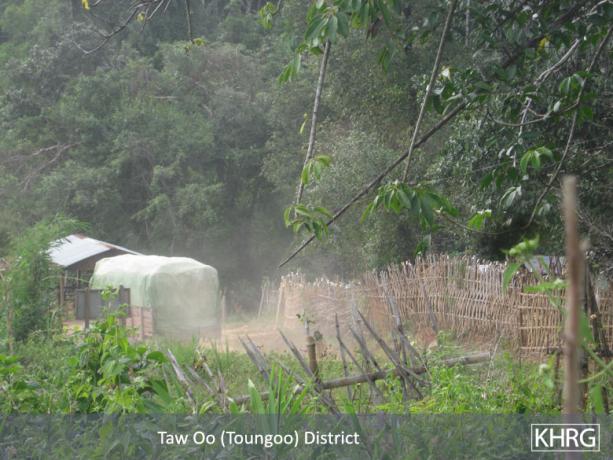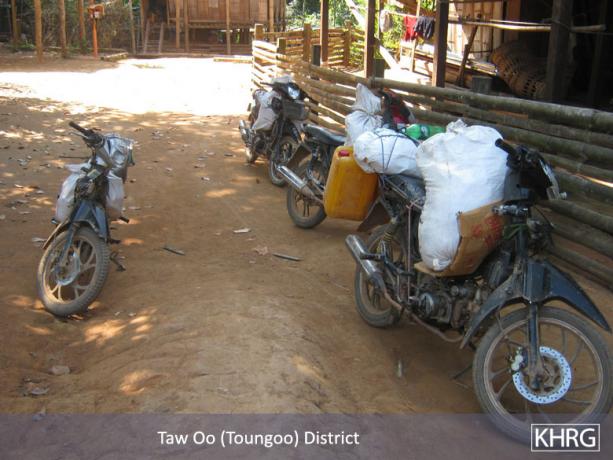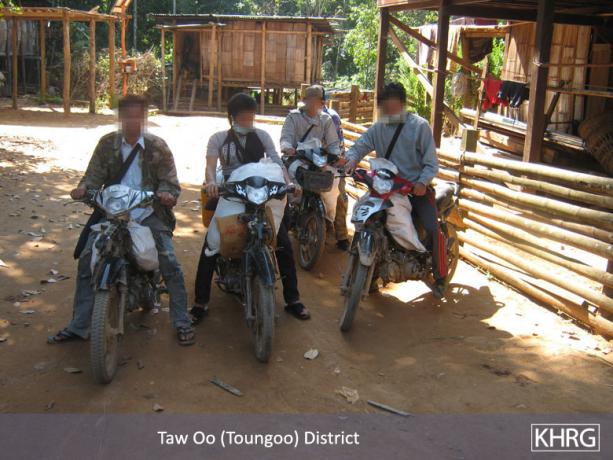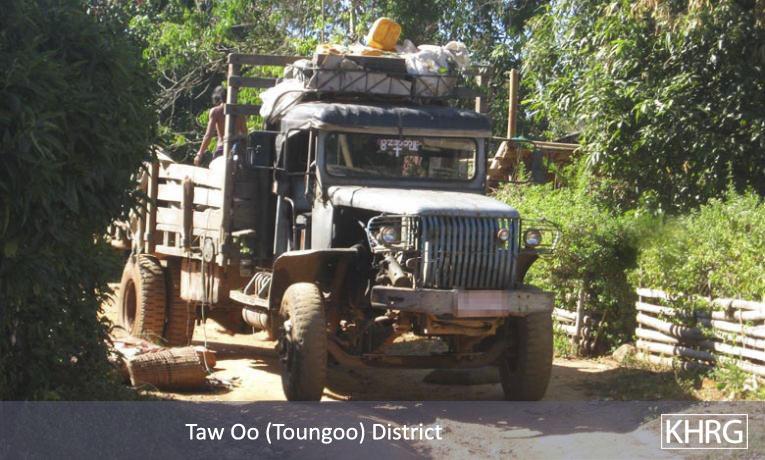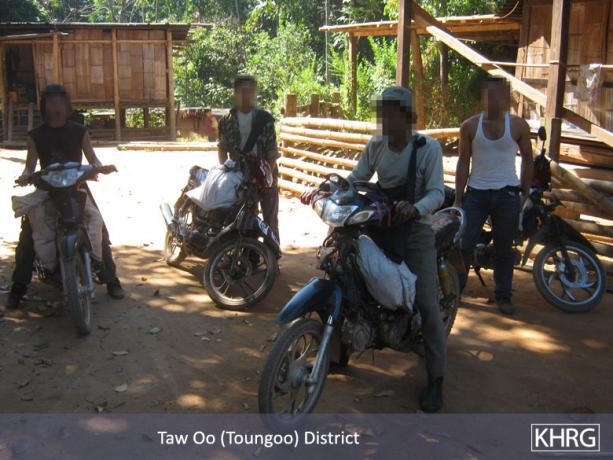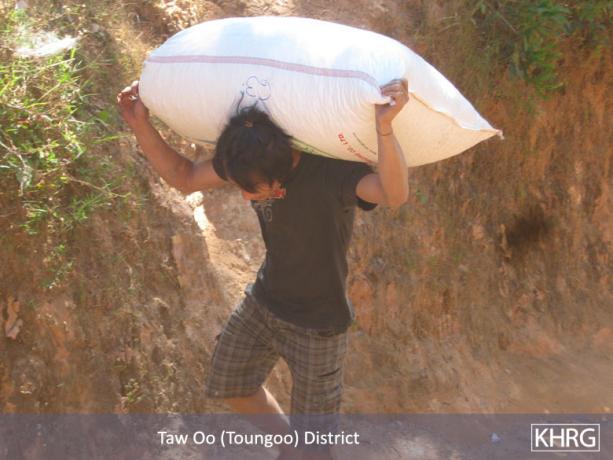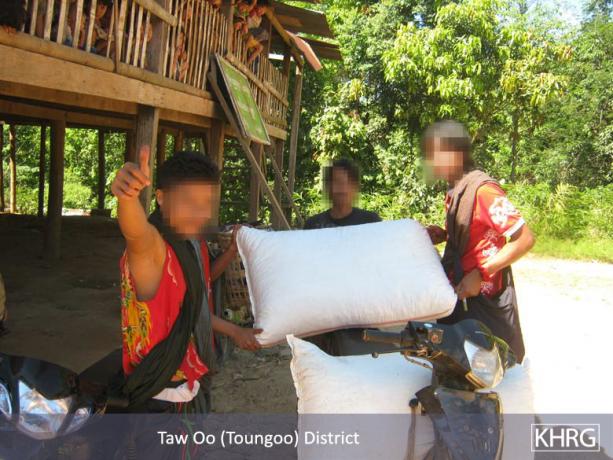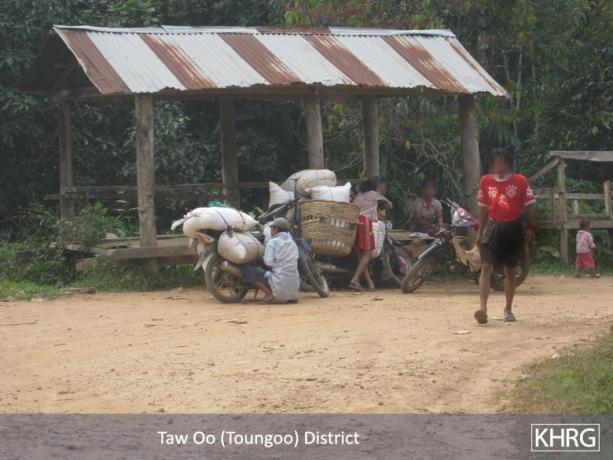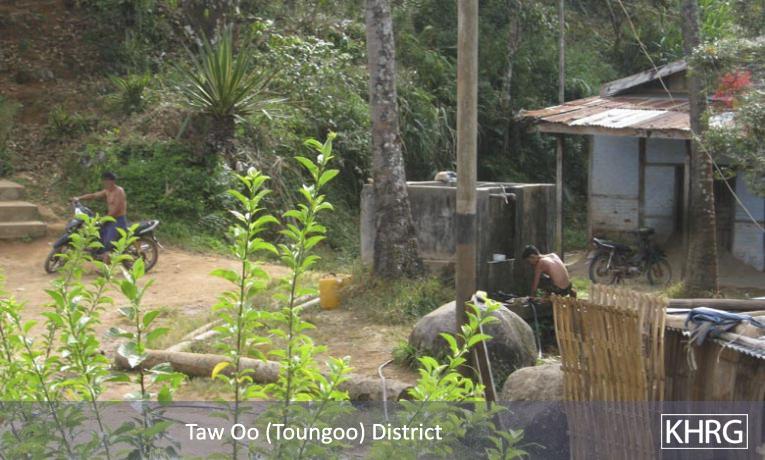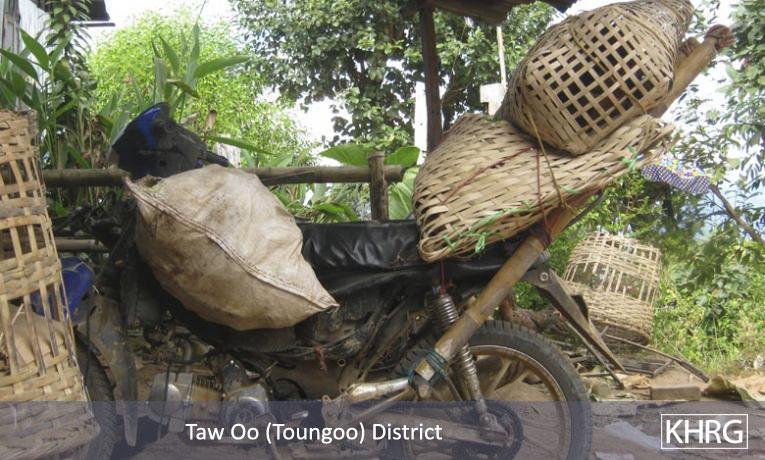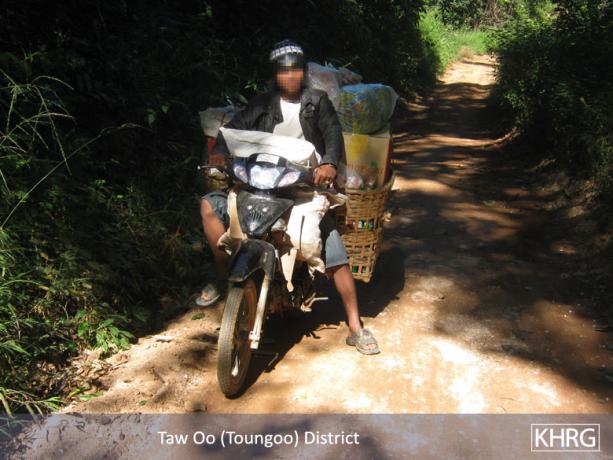In Toungoo District between November 2011 and February 2012 villagers in both Than Daung and Tantabin Townships have faced regular and ongoing demands for forced labour, as well movement and trade restrictions, which consistently undermine their ability to support themselves. During the last few months, the Tatmadaw has demanded villagers to support road-building activities by providing trucks and motorcycles to send food and materials, to drive in front of bulldozers in potentially-landmined areas, to clean brush, dig and flatten land during road-building, and to transport rations during MOC #9 resupply operations as recently as February 7th 2012.
In Toungoo District, villages under the control of Tatmadaw Military Operations Command (MOC) #9 continue to face regular and ongoing demands for forced labour, specifically during military re-supply operations and road-building activities.
Information received by KHRG in February 2012[1] illustrates that between November 2011 and February 2012, this has included villagers forced to use their own trucks and motorcycles to transport food and road-building equipment, to support road-building by driving in front of bulldozers in potentially landmined areas, and to clear brush, dig and flatten land to build new vehicle roads. In addition, villagers travelling on vehicle roads, including the Toungoo – Kler La road, are required to pay arbitrary fees of at least 500 kyat (US $0.64)[2] at each checkpoint and procure a written travel permission document for each trip, which costs 1,000 kyat (US $1.30) every time.
Forced Labour
Between November 2011 and February 2012, villagers in both Townships of Toungoo District have faced ongoing demands for forced labour, attendant to re-supply operations for MOC #9 soldiers in the Kler La area during February 2012 and the construction of two new roads, one from Kaw Thay Der in Tantabin Township to Naw Soe and another from Tee Ta Pu in Than Daung Township through Bpa Gkaw Der and Maw Pah Der to Kler La Town.
February 2012
During February 2012, soldiers under Light Infantry Division (LID) #66 patrolled along the vehicle road to take security for re-supply operations by MOC #9 and a total of four villages in the Kler La area were ordered to provide motorbikes to transport rations from Kler La to 94-mile Camp; a fifth village was ordered to supply motorbikes to transport rations from Kler La to Naw Soe Camp.
|
Date
|
Village providing motorcycles
|
No. Motorcycles
|
Transport rations from:
|
Transport rations to:
|
Journey length (one-way in hours)
|
|
Feb. 4, 2012
|
Khaw Thoh Kee
|
17
|
Khaw Thoh Kee
|
94-mile Camp
|
3
|
|
Feb. 5, 2012
|
Khay La
|
21
|
Kler La
|
94-mile Camp
|
2.5
|
|
Feb. 5, 2012
|
Kaw Thay Der
|
16
|
Kler La
|
94-mile Camp
|
2.5
|
|
Feb. 5, 2012
|
Kleh Suh Kee
|
10
|
Kler La
|
94-mile Camp
|
2.5
|
|
Feb. 7, 2012
|
Peh Kaw Day
|
13
|
Kler La
|
Naw Soe Camp
|
4.5
|
December 2011
On December 29th 2011, a villager trained by KHRG spoke with Saw B---, a 50-year-old plantation farmer and resident of Ht--- village in Than Daung Township, who informed him that on November 15th 2011, Tatmadaw LIB # [censor for security] soldiers under MOC #9 based in a camp beside Ht--- village ordered 30 Ht--- villagers to carry food for them from Na--- village to their camp at Ht---.
Saw B--- said that because Ht--- village is near the Army camp, Ht--- villagers always have to do forced labour but he said that when the soldiers demanded 30 people, the villagers only sent 20 people. Because the village head can speak Burmese, he went to negotiate with the soldiers and told them: "Our villagers have to work to support our families so we cannot all go as you have demanded, please understand us."
The Ht--- village head's successful negotiation in this case to reduce forced labour demands from 30 to 20 villagers illustrates that villagers' own strategies for negotiation and engagement can yield positive results at the village-level, but underlines the fact that villagers' engagement with local authorities typically occurs only on the basis of local relationships and the moral force of individuals, and in the face of grave risks of violence and other abuse. While the reduction of forced labour demands by even ten villagers is very important as it lessens the number of villagers who have to do forced labour and permits those who don't have to go to pursue their own livelihoods activities, negotiating with armed soldiers nonetheless presents risks to villagers accustomed to the unchecked and unpunished perpetration of violence. It is also difficult for them because most of the time the Burmese soldiers don't listen to villagers and are focused only on what they have ordered them to do.[3]
"They sent letters to us telling us to go for forced labour but we ignored them. If they aren't satisfied and come to our village and harm us, we will accept it."
- Saw M---, (male, 41), K--- village, Than Daung Township, Toungoo District (February, 2012)
On December 30th 2011, a villager trained by KHRG also spoke with Saw N---, a 40-year-old hill field farmer and resident of Y--- village, who said that, on December 9th 2011, the LIB #[censor for security] soldiers under MOC #9 based near Y--- village demanded 32 men and 5 women from Y--- villagers to clean brush, dig and flatten the land to build the vehicle road from Y--- to Ah--- Camp. According to Saw N---:
"We always have to do forced labour for the Burmese Army so we don't have time to do our own work.Villages that are near Burmese Army camps always have to do forced labour for the Burmese Army."
- Saw N---, (male, 40), Y--- village, Tantabin Township, Toungoo District (December 2011)
November 2011
Starting on November 16th, villagers in the Po--- area were ordered to provide unpaid labour to support the construction of a new road from Kaw Thay Der to Naw Soe. Tatmadaw MOC #9 soldiers based in Po--- ordered villagers in the surrounding area to transport petrol and spare machinery parts, as well as supplies for soldiers who were taking security for the bulldozer during the construction of the new road, to Kh--- Camp.
One truck and five motorbikes were ordered to transport the supplies and equipment at a time. Although it only takes three hours to drive from Po--- to Kh---, the villagers driving the truck and the five motorcycles were ordered to stay in Kh--- for five days before returning to Po---.
During this time, according to one of the villagers trained by KHRG who provided information contained in this report, the soldiers at Kh--- ordered the motorbikes to drive in front of the bulldozer as the road was being constructed, leading the motorcycle drivers to suspect they were being used to clear landmines from the intended course of the new road. Each group of five motorcycles and one truck were ordered to stay in Kh--- for five days, before being permitted to return to Po---, at which point a different truck and a new group of five motorcycles was sent to replace the previous group. According to the same villager who provided this information, this cycle of forced labour repeated itself approximately every five days until mid-December.
Movement and trade restrictions
Villagers in Toungoo District continue to complain that they not only have to do a lot of forced labour, which leaves them insufficient time to work on their own jobs, but also that they have to pay arbitrary fees to travel and transport goods, which undermines their ability to use profits from the sale of goods to purchase rice and other basic commodities.
Plantations
The most common livelihood occupations in Toungoo District are cash-crop plantations, such as cardamom, betelnut, and betel leaf.[4] For example, during the cardamom harvest season in August and September, villagers from rural areas harvest their cardamom crop and go to sell it in larger towns, such as Kler La or Than Daung Gyi. They use the money from the sale of their cardamom crop to buy rice because not many villagers farm dry paddy hill fields.
"We have to go and buy our food at Than Daung Gyi. … It takes six hours from K--- village to Than Daung Gyi. … Sometimes they [the Tatmadaw] stop us on the road when we are travelling and we have to wait until they let us go. Even if we've decided to go and come back on the same day, they waste our time so we have to spend the night."
- Saw M---, (male, 41), K--- village, Than Daung Township, Toungoo District (February 2012)
Furthermore, in order to travel on the vehicle roads to larger towns to sell their crops, villagers have to pay taxes at multiple checkpoints and also have to pay at least 1,000 kyat (US $ 1.30) for written travel permission documents each time. In order to acquire a travel permission document to travel to larger towns, villagers who live in areas outside of Tatmadaw-control have to lie and use the name of a village under Tatmadaw-control when they apply for permission.
"Citizens beyond [government] control also face difficulties. It is not easy for them to travel. Moreover, for them to go and buy things in Kler La, they have to [obtain] a written permission document and in this [document] they have to write down [the name of] a village which is under the control [of the government]. If they don't do that, and are seen, they will be tortured. In addition, they cannot stay in the village and have to stay in betelnut and cardamom fields."
- Situation update written by a villager trained by KHRG, Toungoo District[5] (March 2012)
During 2011, villagers also told KHRG that the price of cardamom fell so villagers did not receive as much profit from selling their crops in larger towns and so faced additional difficulties to buy enough rice to feed themselves and their families.
"We sell a viss of cardamom for 5,000 kyat (US $6.49) this year. We have to wait six years to get [harvest] cardamom. … We have to cut the bushes around the plants, and after six years we will have cardamom. … We can't sell cardamom at high prices anymore. ... I think in 2011 and 2012 [it was, and will continue to] be hard for us K--- villagers to get enough food. The prices of the products are also very low and irregular."
- Saw M---, (male, 41), K--- village, Thandaung Township, Toungoo District (February, 2012)
Motorcycles
Most of the villagers in Toungoo District use motorcycles to travel on the Toungoo – Kler La vehicle road. Some villagers support their livelihoods by driving the motorcycles because there are very few cars in the area. Motorcycle drivers in the area have complained that petrol is getting more expensive and also that they have to do a lot of forced labour and don't have time to work on their own jobs.
"If a motorbike driver travels there, they have to pay 500 (US $0.64) or 1,000 kyat (US $0.65 or 1.30) at each gate. Motorbike drivers also have to [have] written permission to travel: one permission document [for each] time. It costs 1,000 kyat (US $1.30) for one permission document. … The motorbike drivers have complained about the gate payments. Petrol is also expensive so travelling is not so easy."
- Situation update written by a villager trained by KHRG, Toungoo District[6] (March 2012)
Motorcycles are often used when villagers want to buy rice or sell their cardamom or other crops in larger towns. They use motorcycles to transport their harvested crop to larger towns and bring back supplies purchased with money earned from the sale of the crops. Villagers have told KHRG that they are not allowed to carry food and medicine back to their villages from larger towns.[7]
"The SPDC does not allow villagers to take medicine between Toungoo Town and Kler La. For this reason, in our area, medicines are very expensive. If the villagers bring medicines they have to do it secretly. If the SPDC sees anyone doing that, they will arrest them and put them in prison."
- Situation update written by a villager trained by KHRG, Toungoo District[8] (June 2011)
"They blocked the road so villagers weren't able to buy rice [and transport it along the road] so people had to buy their rice in secret. Vehicles weren't allowed to travel along [the road] carrying rice to the village, and so the price of food went up. There is rice available to buy but it is too expensive."
- Saw T---, (male, 46), H--- village, Thandaung Township, Toungoo District[9] (September 2011)
Conclusion
As of February 2012, forced labour was ongoing in five villages in Tantabin Township. During November and December 2011, regular forced labour demands were also documented by villagers trained by KHRG in Toungoo District, as well as complaints by villagers that they don't have enough time to do their own work as a result. Furthermore, even if they want to go and sell their crops in larger towns, they have to pay fees at checkpoints to be able to carry goods to town and sell them, and they face restrictions on the transport of basic food commodities and medicine, which continue to have negative impacts on health and food security.
"There is not enough medicine because the Burmese Army does not allow people to bring medicines back from towns to mountain areas, so it is a big problem. If they see people carrying medicines, they arrest and torture them. Moreover, they punish them [by sending them] to prison. … If [people are] seriously sick, they have to be sent to the hospital at Kler La or Than Daung. You must have enough money to go to the hospital so they will treat the patient. You should not have hope [to be cured] if you don't have money. For this reason, people who should not die, die."
- Situation update written by a villager trained by KHRG, Toungoo District[10] (March 2012)
Footnotes:
[1] This report is based on a set of information gathered by two villagers trained by KHRG to monitor human rights abuses in Toungoo District, including four incident reports, 19 interviews, one situation update, and 559 photographs. In order to increase the transparency of KHRG methodology and more directly communicate the experiences and perspectives of villagers in eastern Burma, KHRG aims to make all field information received available on the KHRG website once it has been processed and translated, subject only to security considerations. KHRG's most recently-published field information from Toungoo District can be found in the Report, "Toungoo Situation Update: November 2011 to January 2012," KHRG, March 2012.
[2] All conversion estimates for the Kyat in this report are based on the fluctuating informal exchange rate rather than the government's official fixed rate of 6.5 kyat to US $1. As of March 9th 2012, this unofficial rate of exchange was US $1 = 770 kyat . This figure is used for all calculations above.
[3] Past experience with violence and ongoing threats of the perpetration of violence continues to limit villagers opportunities for mitigating arbitrary demands for labour, food and resources levied on them by armed soldiers. See Civilian and Military order documents: March 2008 to July 2011, KHRG, October 2011, p. 9; Supporting local responses to extractive abuse: Commentary on the ND-Burma report Hidden Impact, KHRG, September 2010; Village Agency: Rural rights and resistance in a militarized Karen State, KHRG, November 2008.
[4] In Burmese, "betelnut" and "betel leaf" are referred to as "kon ywet" and "kon thih," as if they are from the same plant. The Burmese names are also commonly used by Karen language speakers. "Betel nut" is the seed from an Areca Palm tree, areca catechu; "Betel leaf" is the leaf of the Piper betel vine, belonging to the piperaceae family. For more information about cash crops grown in Toungoo District, see "Attacks on cardamom plantations, detention and forced labour in Toungoo District," KHRG, May 2010.
[5] See "Toungoo Situation Update: November 2011 to January 2012," KHRG, March 2012, which was written by one of the two villagers who took the photos and provided information included in this report.
[6] "Toungoo Situation Update: November 2011 to January 2012," KHRG, March 2012.
[7] For further background about long-standing movement and trade restrictions in Toungoo District, see "Forced Labour, Movement and Trade Restrictions in Toungoo District," KHRG, March 2010.
[8] "Toungoo Situation Update: April 2011," KHRG, June 2011.
[9] "Toungoo Interview: Saw T---, September 2011," KHRG, February 2012.
[10] "Toungoo Situation Update: November 2011 to January 2012," KHRG, March 2012.

